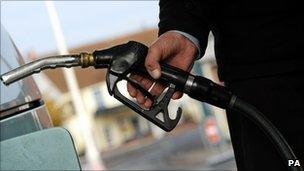Gap between diesel and petrol prices widens, says AA
- Published

The gap between the average price of diesel and petrol has widened to 7.25p
The gap between the average price of diesel and petrol has grown to its widest level since 2008, the AA says.
Its figures show the average price of petrol has fallen by 0.81 pence a litre over the past month to 133.70p.
At the same time, the average price of diesel has risen by 1.3p a litre since mid-October to 140.95p.
Diesel is usually more expensive than petrol thanks to higher refining costs, but the AA says the price is rising now due to short supply to the UK market.
The figures showed petrol was most expensive in London, averaging 134.8p, while Northern Ireland was the most expensive for diesel, averaging 141.8p.
Yorkshire and Humberside was the cheapest region for both, averaging 132.8p a litre for petrol and 140.3p a litre for diesel.
"The fall in the price of oil due to the eurozone crisis had brought some hope of respite for drivers but the opposite has happened for diesel car owners," said Edmund King, the AA's president.
"The petrol price may have been falling overall, but it's dropped faster for some than others, and that adds to the frustration."
'Diesel woes'
The government plans to increase fuel duty by 3p a litre in January, meaning an extra £1.50 to fill an average car, and Chancellor George Osborne is under pressure to scrap that as part of his autumn statement on the economy later this month.
Earlier this week, MPs approved a motion urging action on fuel prices in response to an e-petition signed by 110,000 people, but it is not binding on ministers.
"Tuesday's House of Commons debate on high fuel prices offered little hope of a freeze in fuel duty and diesel woes, if they continue, will intensify pressure on the Treasury," Mr King said.
The AA said that the current 7.25p price difference between diesel and petrol, although dwarfed by the 15.3p gap seen during the "extraordinary price spikes" in November 2008, was bad news for drivers who had traded in their petrol cars for diesels.
"Many switched in the hope that greater fuel efficiency would recoup the extra cost of buying the vehicle before saving significantly on subsequent fuel costs," the organisation said.
"The break-even point is now stretching further away as the price gap grows."
- Published8 November 2011
- Published15 November 2011
- Published28 January 2011
- Published7 January 2011
- Published7 January 2011